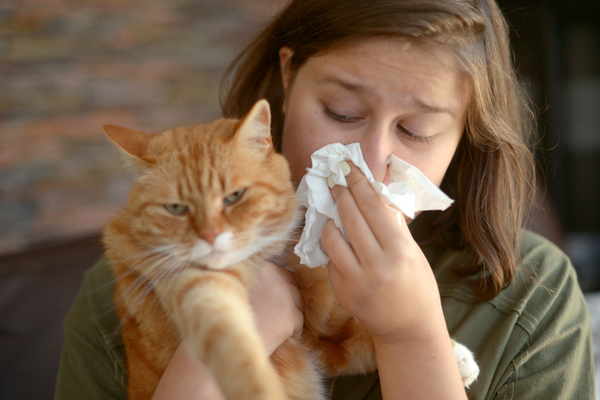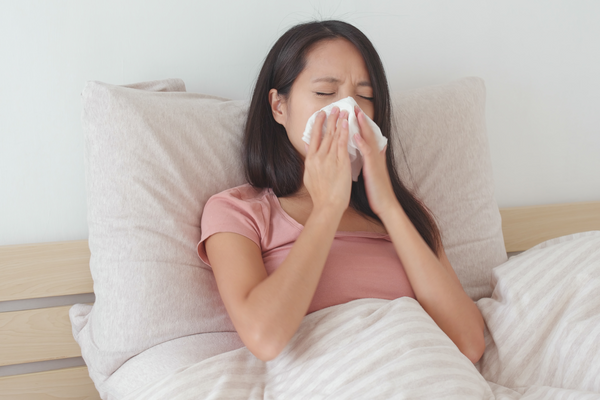The Link Between Food Allergies and Environmental Allergies

Food allergies and environmental allergies are major public health issues with growing prevalence globally. These conditions significantly impact the lives of millions of allergy sufferers and their families. With more than 50 million Americans affected by environmental allergies, food allergies, and other allergic diseases, you or someone you love is likely managing one or more of these conditions.
There’s so much more to allergies than sneezing or hives. Allergies can have a major impact on a person’s overall quality of life. Depending on the severity of allergies, they can make it difficult to enjoy everyday activities or stay productive.
Allergies are the sixth leading cause of chronic illness in the United States. According to the Allergy and Asthma Network, the tendency to develop allergies is often hereditary, passed down from generation to generation. However, not everyone will be allergic to the same things, and some won’t have any allergies. So, is there a link between food allergies and environmental allergies? And what are the differences between these allergic conditions? Let’s take a look.
What is a Food Allergy?
A food allergy occurs when the body’s immune system reacts to a particular food protein because it has mistaken that protein as a threat. Allergic reactions caused by food vary from mild symptoms, often involving skin rash, hives, itching, and lip swelling, to severe, potentially life-threatening reactions (called anaphylaxis) that may include fatal respiratory problems and shock. According to Food Allergy Research and Education (FARE), people with asthma have a higher risk of severe allergic reactions to food.
Food allergies are prevalent, affecting as many as 32 million Americans, including nearly 6 million children. The Centers for Disease Control and Prevention (CDC) has reported a 50% increase in children with food allergies since the late 1990s. While numerous theories have been suggested as to why the number of people with food allergies is growing, the cause has not yet been scientifically proven.
Although no specific genes have been identified, numerous studies show that food allergies are at least in part genetically determined.
Even trace amounts of a food allergen can cause a reaction in some people. While promising prevention and therapeutic strategies are being developed, food allergies currently cannot be cured. Early recognition and learning how to manage food allergies, including which foods to avoid, are essential to preventing serious health consequences.
Common Symptoms of Food Allergies
Allergic symptoms may begin within minutes to two hours after ingesting, inhaling, or touching the food allergen. Symptoms of food allergies vary from person-to-person, but typically include:
- Swelling and itching of lips and mouth
- Tightness in the throat or hoarse voice
- Nausea
- Vomiting
- Diarrhea and cramps
- Itchy, raised bumps (hives)
- Rash
- Swelling of the skin
- Itching
The symptoms of a food allergy may look like other health conditions or problems. Always talk with your healthcare provider for a diagnosis and the best course of treatment.
Major Food Allergens
Although nearly any food can trigger a reaction, eight food allergens cause over 90% of allergic reactions in the U.S.:
- Milk
- Eggs
- Peanuts
- Soybeans
- Tree nuts
- Wheat
- Fish
- Shellfish
Additionally, allergy to sesame is an emerging concern. About 40% of people with food allergies are allergic to more than one food.
What is an Environmental Allergy (Allergic Rhinitis)?
Environmental allergies differ from food allergies because they’re not a reaction to something ingested for nutrition. Instead, environmental allergies are triggered by substances (allergens) that an allergy sufferer inhales or comes into contact with in their surroundings.
While people with seasonal allergic rhinitis typically experience symptoms triggered by pollen and airborne mold spores in the spring, summer, and early fall, those with perennial allergic rhinitis experience symptoms year-round, usually triggered by sensitivity to common indoor allergens.
Common Symptoms of Environmental Allergies
Some of the symptoms of environmental allergies, or allergic rhinitis, include:
- Runny or stuffy nose
- Sneezing
- Coughing
- Itchy, red, watery eyes
- Shortness of breath
- Itching around the nose, mouth, or eyes
- Headaches
- Wheezing
- Fatigue
Common Environmental Allergens
The most common indoor allergens are:
- Dust mites
- Pet dander
- Mold
- Cockroaches
- Pollen
Is There a Link Between Food Allergies and Environmental Allergies (Allergic Rhinitis)?
Allergic rhinitis frequently coexists with other common allergic manifestations like asthma, eczema, and food allergies. However, more research is needed to determine the connection between the disorders.
According to the Centers for Disease Control and Prevention (CDC), children with food allergies are two to four times as likely to have other allergic conditions, such as environmental allergies, asthma, or eczema, than children without allergies.
Some people who are allergic to the proteins in one substance (typically pollen) have allergy symptoms when exposed to another substance (typically food). This is known as cross-reactivity. For example, if someone is allergic to birch pollen, they may also find that eating certain foods (such as apples or hazelnuts) causes a reaction. Up to 80% of people who suffer from birch pollen allergies also have food allergies.
There is no cure for environmental allergies or food allergies. Both allergic conditions are often managed by avoiding allergens and learning to recognize and treat symptoms.
Final Thoughts
At The Ecology Works, we aim to improve awareness and understanding of allergic diseases. Every product we make comes with the promise that we are actively working toward environmentally-sound products that enhance the quality of life. Our products help safeguard homes, schools, hospitals, and other community environments from allergens, pathogens, and environmental toxins. Learn more about our products and ethos here.
Have questions about cleaning or reducing common household allergens? We have answers! The Ecology Works has been helping people with allergies and asthma since 1993. We can help you select the products you need to live a better, allergen-free life. Check out our Instagram for more cleaning and allergen-reducing tips. Please feel free to Contact Us or message us on Facebook. No question is too small! We’re here to help.





